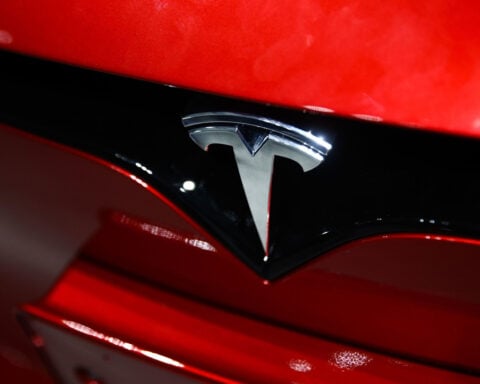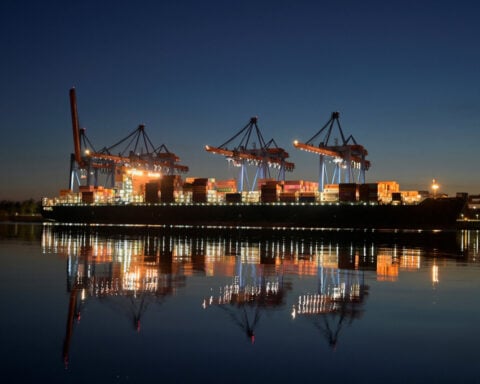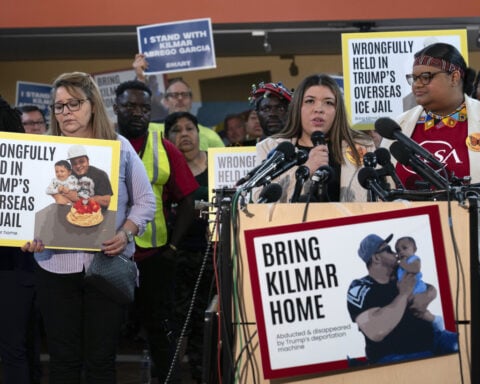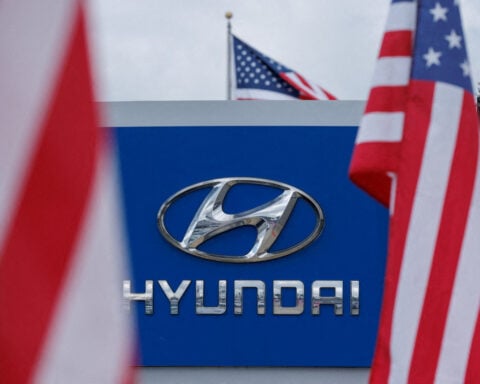(CNN) — While the White House wages a trade war on behalf of US manufacturing, the largest and most important part of the American economy — one that has a trade surplus, not a gap — is under threat.
The US trade gap, caused by American consumers and businesses importing more goods than they’re exporting, has gotten all the attention in the debate over tariffs
But we sell far more services than we purchase from other countries. This means the US service sector enjoys a trade surplus with almost every trading partner around the globe, including those at the center of the trade battle: China, the European Union member states, Canada and Mexico.

America’s trade surplus in services rose to $293 billion in 2024, up 5% from 2023 and up 25% from 2022, according to Commerce Department data.
Service sector businesses “are all industries that power American economic growth. They’re the US economy’s secret sauce,” said Mark Zandi, chief economist for Moody’s Analytics. “We sell a lot of services into the rest of the world and these countries know that and they’ll use it against us that if push comes to shove. They can put up trade barriers and enforce new standards before you come into the country.”
And that’s why even if tariffs brought back some manufacturing jobs, likely years from now, those US factory jobs may not make up for the loss of service sector jobs.
The service sector includes just about anything that doesn’t come out of a factory, farm, mine, or oil well. It includes retailers, restaurants and hotels, as well as software, internet and telecom providers. There are truckers and airlines, movie studios and media companies. It’s also schools and health care providers, lawyers and accountants.

Services long dominated American jobs
Jobs in the service sector have long driven the US economy, despite the image of a mid-20th century America as a country backed by manufacturers.
The service sector employed 57% of private sector non-farm workers in 1939, in the midst of the Great Depression, when the Labor Department started tracking US employment. Today, service sector businesses account for 84% of those jobs.
Manufacturers accounted for as much as 44% of private sector jobs during World War II, but that has been falling steadily since then. Last year, less than 10% of private sector employees worked in manufacturing, according to the Labor Department data. That’s primarily due to automation and the growth of the service sector. Trade is a distant third for the causes of its reduced importance.
It’s normal for manufacturing jobs to shrink as a percentage of employment as a country gets wealthier and more technologically advanced, according to Cardiff Garcia, editorial director of the Economic Innovation Group, a bipartisan public policy organization.
“That’s just the way an economy evolves,” Garcia told CNN on Thursday. “If you want to employ a big share American workers in manufacturing, you almost have to drag the economy back into the past.”
Service sector jobs at risk
Even within the auto industry, the center of much of the tariff dispute, service sector jobs outpace manufacturing jobs. About 1.3 million workers are employed at America’s car dealers, and only 1 million work at US auto plants and parts makers. And number of dealer jobs may fall if tariffs reduce the supply of cars and the price of cars increase, as is expected to happen.
That’s especially true for automakers which now face tariffs on all cars destined for their US dealerships, such as Volkswagen-owned Audi, which has no American factories.
“When the president says, ‘I don’t care if foreign cars are sold in the United States,’ the challenge of that is we have people in the United States employed by foreign car dealerships, you’re somehow saying their jobs are less worthy,” said Jason Miller, a business professor at Michigan State University.
If other countries retaliate in response to the US tariffs, that could also take aim at Americans services abroad.
For example, China, the second largest market for movie box office, is considering restrictions on US films being exported there.
In addition, the European Union could place limitations on American banks to operate as freely there. It is also weighing massive fines for US technology companies.
“Push too far, and (the EU) could tighten the screws — digital levies on Silicon Valley, regulatory clamps on Wall Street or taxes on U.S. pharma exports,” said Tobias Gehrke, a senior policy fellow at the European Council on Foreign Relations.
Loss of domestic business as well
And the trade war, and the other Trump administration actions on immigration, could also cut down on the number of college and university students who come here on student visas.
There are about 1.1 million international students, making up about 7% of students on all campuses, according to Institute of International Education. The tuition, room and board that they pay is not only crucial to many schools, it also reduces the nation’s trade deficit. But the Trump administration has been revoking hundreds of student visas, and even some students who are not at risk of losing their visas are becoming reluctant to attend American schools in the current environment.
International tourist visits are also expected to drop, potentially costing billions for hotels, restaurants and attractions such as theme parks.
Tourism Economics, a firm that tracks the hospitality industry, forecasts a 9.4% decline in international visitor in the US for 2025, led by a 20.2% decline in visitation from Canada. The firm also estimates that international visitor spending in the US is expected to decline 5%, which would mean a loss of $9 billion this year alone.
This is a stark contrast from the end of last year, when Tourism Economics estimated a nearly 9% increase in international visitors, with a 16% increase in spending by foreign travelers.
“Trump’s policies and pronouncements have produced a negative sentiment shift toward the US among international travelers,” said a statement from Tourism Economics.
Recession risk
On Wednesday, Delta Air Lines said it’s expecting less travel by Americans in the second half of this year; the airline will cut the seat additions that it had planned for 2025 and will trim its payrolls through attrition. CEO Ed Bastian said he now sees a recession as likely.
And there will be fewer jobs or skimpier paychecks moving goods, as well. American trucking employs 1.5 million and warehousing and storage another 1.8 million, according to the Labor Department.
About 40% of the cargo moving through the Port of Los Angeles, the nation’s largest, is coming from or going to China, said Gene Seroka, the port’s executive director. He projects a 10% drop in cargo in the second half of this year due to tariffs.
“We’re not going to see mass layoffs. But the amount of work will be much less than it traditionally has been,” he said.
The biggest danger to service jobs, though, comes from the possibility of a tariff-sparked recession, with cash-strapped Americans spending less and businesses failing or pulling back.
“Because we’re a service economy, services take the brunt of that,” said Zandi. “Health care, education, financial services. Every industry gets nailed in a recession.”
The-CNN-Wire
™ & © 2025 Cable News Network, Inc., a Warner Bros. Discovery Company. All rights reserved.

 Trump has begun another trade war. Here's a timeline of how we got here
Trump has begun another trade war. Here's a timeline of how we got here
 Canada's leader laments lost friendship with US in town that sheltered stranded Americans after 9/11
Canada's leader laments lost friendship with US in town that sheltered stranded Americans after 9/11
 Chinese EV giant BYD's fourth-quarter profit leaps 73%
Chinese EV giant BYD's fourth-quarter profit leaps 73%
 You're an American in another land? Prepare to talk about the why and how of Trump 2.0
You're an American in another land? Prepare to talk about the why and how of Trump 2.0
 Chalk talk: Star power, top teams and No. 5 seeds headline the women's March Madness Sweet 16
Chalk talk: Star power, top teams and No. 5 seeds headline the women's March Madness Sweet 16
 Purdue returns to Sweet 16 with 76-62 win over McNeese in March Madness
Purdue returns to Sweet 16 with 76-62 win over McNeese in March Madness








